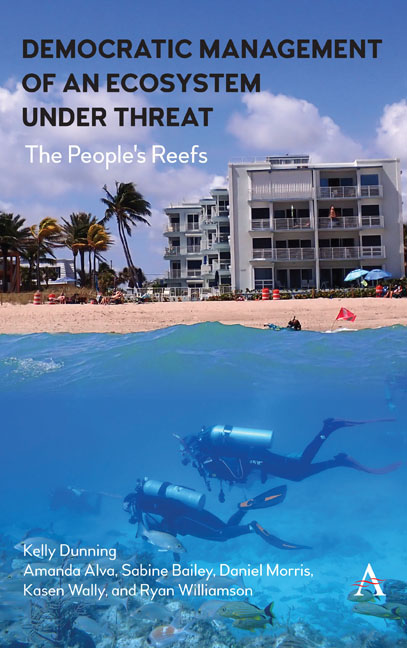Book contents
- Frontmatter
- Contents
- Miscellaneous Frontmatter
- Part 1 The Climate Change Challenge to Coral Reefs That Will Require Conservation Theory And Practice to Evolve
- Part 2 Case Studies
- Part 3 Summary and Conclusions
- Appendix Chapter 5
- Appendix Chapter 6
- Appendix Chapter 7
- Appendix Chapter 8
- Appendix Chapter 9
- Index
Appendix Chapter 6
Published online by Cambridge University Press: 28 February 2024
- Frontmatter
- Contents
- Miscellaneous Frontmatter
- Part 1 The Climate Change Challenge to Coral Reefs That Will Require Conservation Theory And Practice to Evolve
- Part 2 Case Studies
- Part 3 Summary and Conclusions
- Appendix Chapter 5
- Appendix Chapter 6
- Appendix Chapter 7
- Appendix Chapter 8
- Appendix Chapter 9
- Index
Summary
Methods
Case selection
The 2015 Port of Miami dredging project in Florida, United States, was the selected case study for this research. An environmental dispute emerged due to the organization of local stakeholders who were concerned over the uncertainty over ecological impacts of these projects on reefs. The project took place in Miami, which is a popular destination in the tropics, whose economy is strongly tied to trade and the tourism industry. Furthermore, the port project takes place in a wealthy location based on gross domestic products and has institutions and resources that allow for coalitions to emerge. We apply the Narrative Policy Framework as the theoretical lens to assess how narrative strategies were used to influence policy outcomes regarding these port projects.
Research design
The case study is the research design for this study, and it is appropriate because it allows the researcher an in-depth investigation to answer why and how decisions were made, examines contemporary events over which the researcher has no control over and enables multiple sources of data to converge toward an explanation (Yin, 2018). The project specifically uses a case-study design and mixed methods to provide more rigorous and robust findings (Creswell & Clark, 2019; Johnson et al., 2007; Yin, 2018). Mixed methods research is when a researcher combines qualitative and quantitative elements of research methods and integrates multiple forms of data (Creswell & Clark, 2019). We collected document and interview data from local stakeholders involved in the port project to identify the narrative strategies that were employed.
Data collection
For the Port of Miami case study, data were collected from four sources: the Nexis Uni database, the US Army Corps of Engineers (USACE), Jacksonville District news archive, the Miami WaterKeeper press and blog archive, and the World Access News database. A total of n = 103 documents were collected, which consisted of news releases, articles and position statements. Using the search terms “Miami” and “Deep Dredge Project” between 2010 and 2020 in Nexis Uni resulted in n = 65 documents. This date range was chosen because political leaders announced the start of the deep dredge project in 2010, and even though the project was completed in 2015, coral mortality reports and papers were published from 2016 to 2019.
- Type
- Chapter
- Information
- Democratic Management of an Ecosystem Under ThreatThe People's Reefs, pp. 203 - 208Publisher: Anthem PressPrint publication year: 2023

